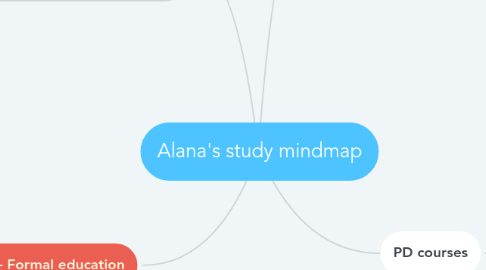Alana's study mindmap
by Lan Smith

1. School - Formal education
1.1. Very white-washed - "Captain Cook discovered Australia in 1788". Indigenous people were referred to as "Natives" or "Aboriginies" and depicted as people living a primitive lifestyle "in the bush / dessert".
1.2. Schooling has seen a focus on skill learning and the ability to repeat information given. Critical thinking skills (at least in the past), were not promoted. Students were taught WHAT to think, not HOW to think. The "importance" of NAPLAN tasting serves to further this notion.
2. University - Post graduate - Grad Cert Education (Indigenous Education)
2.1. "Coming together" of knowledge and understandings - how First Nations people were treated, including limited education, low expectations, denial of mother tongue and traditional language, Euro-centric curriculum... and how this has impacted on education perspectives today
2.2. Provided an awareness for what culture is and how it is perceived. So tough to define one's own when one feels distanced from it. This offered insight into how Aboriginal and Torres Strait Islanders might feel, especially those who have lost connection to kin and Country due to harsh and cruel government policy and practice.
2.3. Offered increased awareness of the language used eg "Our" First Nations people can be viewed as paternalistic, not as I had envisioned, a part of a holistic and shared history.
3. University - Undergraduate - B.Ed(EC)
3.1. Only one Indigenous-themed course in a four-year subject and multiple people complained that Australia's own history and the truth of it was less than "other more important and relevant cultures" and was "pointless".
3.2. Course was very much from an Anglo perspective, with westernised values for teaching and learning the focus.
4. PD courses
4.1. Aside from self-funded PD's, I have had no training revolving around cultural competence, whilst in the workforce. My previous employer, a large corporation refused to pay for me to attend training or provide time for me to do so.
4.2. Current employer values Indigenous education and has provided online access to ECA's Reconciliation Connect online symposium for the past two years. Due to staffing arrangements, was only possible this year due to the fact that one person pulled out, despite the link to my studies and the fact that I am one of two chair people for my Centre's RAP.
4.3. Western knowledge is privileged in training sessions.


